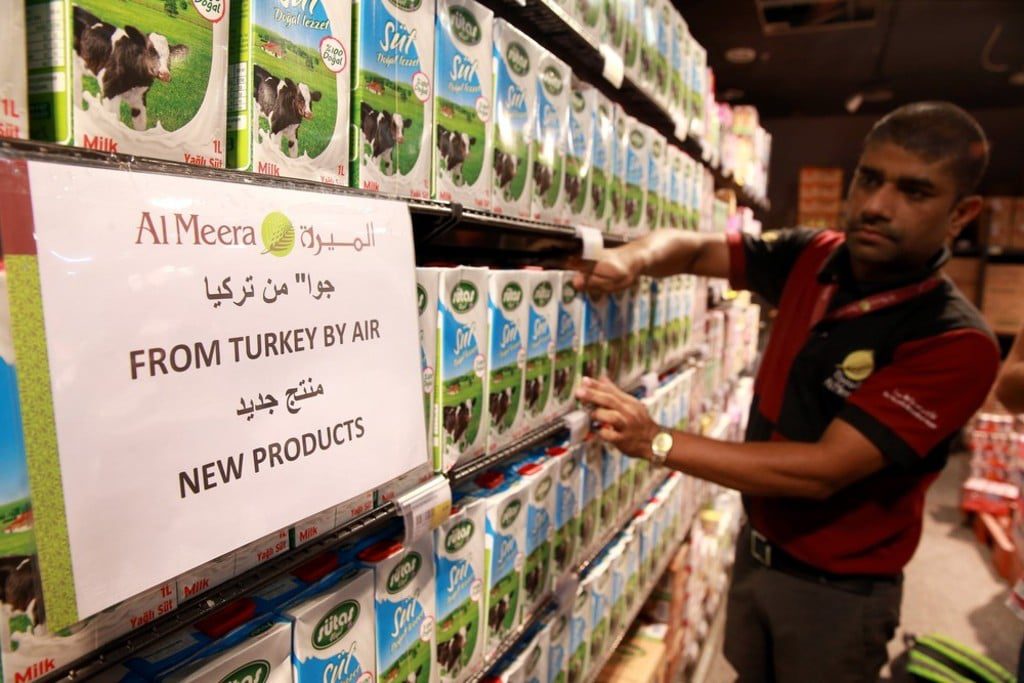
In 2014, Bahrain, the United Arab Emirates (UAE) and Saudi Arabia cut diplomatic ties with Qatar for its support of the Muslim Brotherhood, the critical coverage of its media and its ties with Iran. Eight months later, after the Gulf state expelled several leading Brotherhood members, the diplomats returned.
They were recalled again in June 2017. Apparently, Qatar was still not behaving according to the wishes of its neighbours, who have promised – as Qatar insists it does not know what it is doing wrong – to publish a ‘list of grievances’.
Realizing that a merely diplomatic – and thus mostly symbolic – gesture would be ineffective, the other Gulf Cooperation Council (GCC) members (plus Bahrain, Egypt and some client states) imposed a sea, land and air blockade as well. The decision sparked a political crisis within the GCC, which may not be resolved any time soon. But what are the implications for Qatar’s economy?
Food and other imports, which used to come mainly from Saudi Arabia and the UAE, have stopped. If one believed the alarmist headlines about ‘food aid flights’ from Iran and Turkey into ‘isolated’ Qatar, one could easily think that the country was on the brink of starvation.
It would be if it were indeed isolated, given that it hardly produces anything itself. However, it is not isolated and there are alternatives. Plus money. Qatar has activated these alternatives rapidly and, so far, successfully.
Flights and ships from countries that have not joined the blockade still come into its (air)ports. These include GCC members Oman and Kuwait, who have remained neutral in the dispute and quickly stepped in to fill the gap. New shipping links have also been opened or expedited, for example with India.
The same goes for supply lines. One only needs to visit a Qatari hypermarket to see that there are no shortages, no empty shelves and no panic-buying. Saudi milk has been replaced by Turkish milk, Saudi yoghurt by Iranian yoghurt, Saudi chicken by Pakistani chicken and so on.
When asked, shoppers said they had not noticed any marked price increases. Whether this is because the new suppliers give similar deals to the previous ones or whether the Qatari government is subsidizing the price difference is hard to say.
Indeed, it is unlikely that the ‘food aid’ provided Iran and Turkey is what it seems to be: free food. And why would Qatar not pay for it? Qatar is, after all, the world’s richest country per capita. It is much more likely that this so-called food aid is simply a new business opportunity for new suppliers, who are hoping for a relationship even after the crisis ends.
They may be in luck. As and when the diplomatic storm blows over, Qatar’s embittered businesses may be reluctant to go back to their old suppliers, whom Qataris see as being in breach of their contracts.
The crisis has also encouraged the country to step up its local production capacity. Self-sufficiency has long been on the agenda, but has never seriously taken off. The country imports 90 per cent of its food. This may now change.
Posters from the Ministry of Economy and Commerce in supermarkets draw consumers’ attention to local produce. ‘Together we support national products’ they read. It is not immediately clear what percentage of its needs Qatar could actually meet, considering its arid climate, but with money, technology can be bought.
This money comes mostly from gas. As long as Qatar keeps exporting gas, it is likely to be safe. So far, gas exports have continued uninterrupted and prices have been largely unaffected. For the time being, a steady flow of income seems guaranteed.
Some observers believe gas supplies may give Qatar the protection it needs against a further escalation of the dispute: countries that heavily rely on Qatari gas may push for a peaceful resolution.
Interestingly, one of those countries is the UAE. The UAE has not and will not ban the gas that keeps its power plants running; it cannot afford to leave its citizens without electricity for light and air conditioning. If anything, Qatar could threaten to cut supplies to its neighbours. It is unlikely to do so, however, such a move being tantamount to a declaration of war.
Despite alarmist media coverage, it may not be Qatar’s economy that suffers the most, although state-owned Qatar Airways, which operates dozens of daily flights to GCC and other Middle Eastern countries, may lose out. Qatar’s angry neighbours, many of whom have substantial business interests in the country, are bearing the costs too.
All of this could have been foreseen by Abu Dhabi, Manama and Riyadh. Or not.


